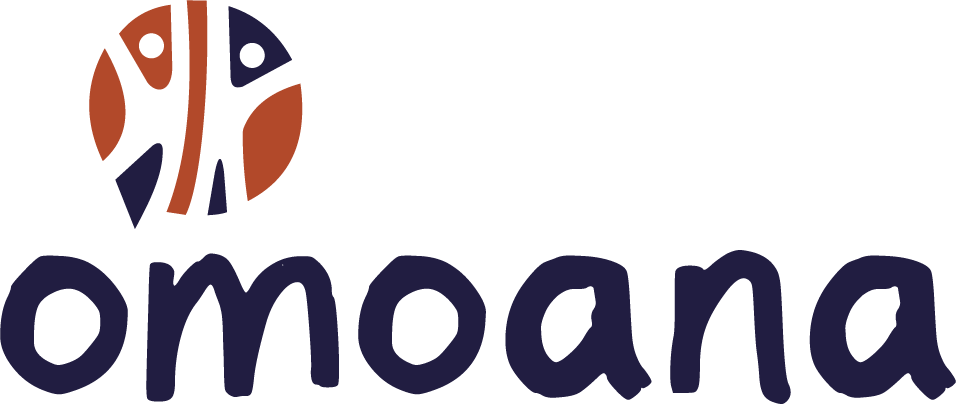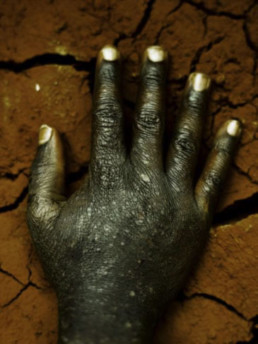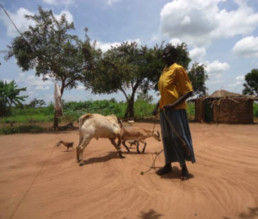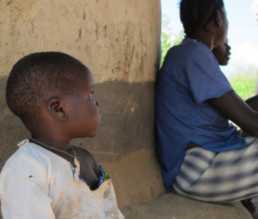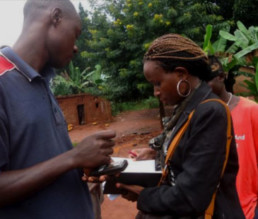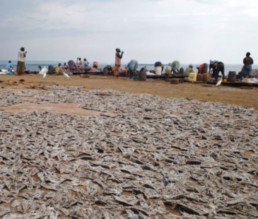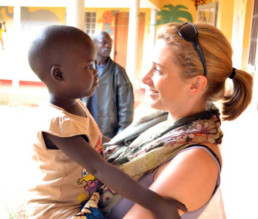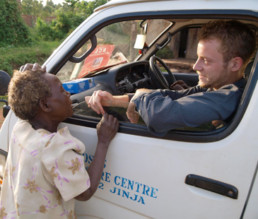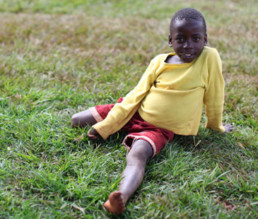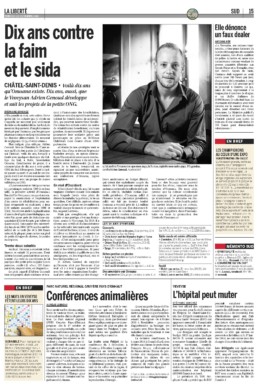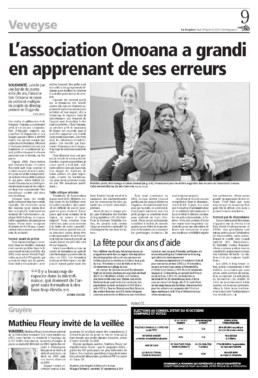AIDS in adolescence
Mary*, one of our beneficiaries, is now 16 years old. She has been supported by Omoana for 9 years. An orphan, she was born with AIDS and lives with her grandmother, who is also HIV-positive. Triple therapy is a lifelong treatment for people living with HIV/AIDS. Our beneficiaries are made aware of the importance of taking the pills regularly and consistently, and of the potential consequences if this is not done.
However, some of them, for reasons linked to adolescence or sometimes a certain distaste for life, stop taking their treatment regularly. They then develop resistance to the triple therapy, as well as numerous infections. Mary has been through this phase. She is now in critical condition, but is receiving quality care in one of the country’s best clinics, in Kampala. She has a pretty face and a slim, slender physique. The nurses tell her that once she has recovered, she could become a model. I’d already thought about it, imagining her one day becoming Miss Uganda! But she told me that she would prefer to become a doctor or a nurse, to help as she had been helped. I told her that she should take her medication more carefully and above all be very studious at school. Now she’s looking to the future again. Let’s hope she can go back to school in 2014. In the meantime, the staff at Omoana House are researching and implementing a strategy to deal with this problem, which is widespread throughout the country.
Adrien Genoud
Coordinator
* fictive name
Microcredit, a few years on
When we launched the microcredit programmes in Jinja in 2008 and then in Gulu (a post-conflict region) in 2010, we were convinced that this type of programme, properly implemented, was the key to effective development. At the outset, many of the beneficiaries embarked on this venture with a certain amount of doubt. Would they be able to repay? Would it really enable them to increase their income? After receiving training, mainly in entrepreneurship, from motivated loan officers, they were given access to loans, initially for a maximum of €40, gradually rising to €250. This enabled them to develop their income-generating activities.
During recent visits to families receiving microloans, I was able to see that this concept really did have a lasting impact on their quality of life. One beneficiary expressed her joy by saying that she felt like she was growing wings! You only have to look at their homes to see this. Many of them have developed their livestock and can testify to a clear improvement in their standard of living, whether in terms of nutrition or access to education for their children. They have gained in self-confidence and do not see themselves as mere victims of war, poverty or AIDS. 2,320 families received microloans in 2013, and many more are hoping to benefit from them. Much of the credit for this goes to the local project managers, Achan Immaculate and Anna Sanyu, two dynamic and dedicated women. We will continue to develop these programmes alongside them, so that our work to ensure the dignity of young Ugandans gives those who look after them the means to do so independently, and so that they can then pass on their wings to their children!
Adrien Genoud
Coordinator
Mental health of people affected by war
For more than 20 years, Northern Uganda has been in the grip of a civil war between the Lord’s Resistance Army and government forces. More than 25,000 children were kidnapped to be used as soldiers. They were forced to commit atrocities and experienced traumatic events that they will never forget. Some had to kill family members, others were sexually abused. In a state of survival, they have sometimes had to drink their own urine. Repeated experiences of this kind inevitably leave their mark on many of them. When they return to their villages, they suffer from post-traumatic stress disorder, which can manifest itself in flashbacks, insomnia and concentration problems.
The region was pacified in 2006. But according to the most optimistic studies, 25% of former child soldiers and 7% of the general population still suffer from this syndrome, which, if left untreated, does not go away. This affects their ability to manage an income-generating activity, and the situation of despair in which they find themselves can push them towards alcoholism. It is important to tackle this problem, for their well-being and for reconciliation in the region. Indeed, people suffering from post-traumatic stress are often irritable and may be badly perceived by other members of their community. Unfortunately, mental health is not one of the government’s priorities. Uganda has just 30 psychiatrists for a population of 34 million.
From 2014, Omoana will be working with VIVO, an organisation specialising in the treatment of psychological trauma in war-torn countries. It is made up of specialists from all over the world and is recognised as one of the leaders in this field. Anett Pfeiffer, a German psychologist, manages a team of Ugandan therapists, who provide people with 12-session therapies that have proved their effectiveness through academic research.
Funds are limited, and access to the most remote areas is difficult. Villagers cannot afford to travel to the city twice a week for therapy. Omoana therefore gives its beneficiaries access to the services of this organisation.
Omoana’s holistic approach, which seeks to provide its beneficiaries with quality economic support as well as access to recognised mental health specialists, can be considered a benchmark programme in post-conflict regions. What’s more, Omoana works as part of a network to offer its beneficiaries the best possible service and maximise resources and knowledge. But to prove the effectiveness of such collaborations, as well as the correlation between social and economic issues in post-conflict regions, investment is needed at academic level. Omoana is keen to host researchers with this in mind.
Adrien Genoud
Coordinator
HIV/AIDS awareness
When HIV-positive and malnourished children are welcomed into Omoana House, the question of reintegration arises from day one. If they arrive in life-threatening conditions, this is often because they have been left to fend for themselves in remote villages in the Jinja region. The Omoana House social worker will visit the children’s families regularly, even before they are reintegrated. She will then have to work with her colleagues to assess which member of the family will be best able to look after them once their state of health has stabilised.
As with each of her projects, Omoana tries to take a holistic approach. To ensure that children are treated as individuals in their own right, it will run HIV/AIDS awareness sessions in their communities. This will encourage reintegration, so that the child is not discriminated against. In the schools and communities she will visit, she will also talk about how to prevent infection, as well as the importance of knowing one’s viral status. Thanks to the team at our partner St.Francis HCS, a health centre for people living with HIV, everyone has the opportunity to take a test, if necessary, get treatment and avoid infecting other people (partners, future children). This can be particularly useful in cases where the children’s own parents do not accept that they are HIV-positive. They need to be convinced to take charge of their own lives so that they can look after their children. The fight against AIDS is not just a question of care. It is first and foremost a social issue. Ignorance can wreak havoc. That’s why Omoana has joined forces with its partner St.Francis HCS and is benefiting from its expertise, to enable 1,301 people in 19 villages to have access to such services in 2013.
Adrien Genoud
Coordinator
Editorial of « News from Omoana », January 2014
In today’s fast-paced Western society, with its overweening individualism, it can sometimes be difficult to become fully aware of the glaring inequalities that govern our world. Yet in this age of communication, with a modicum of curiosity and empathetic interest, we quickly realise just how skewed the balance between North and South is. The breathtaking and disconcerting development of one is currently only possible at the expense of the other. And many of us wallow in this reality, pretending that change is not within our grasp and that it depends on the will of the political and commercial players.
This is to forget the power of symbols and the will of the people. It is up to us to ensure that globalisation is not just a matter of trade and self-interest. It must also be about solidarity, and this choice concerns us all.
Many organisations are highlighting the absurdities of Swiss and international politics, which prioritise economic well-being and abundance over consideration for human rights and respect for nature. There are alternatives to this model. For example, the quality and quantity of what we consume influences supply and thus potentially the lives of thousands of manufacturers, craftspeople and producers here and abroad. Fair, local and organic trade is not just the result of a passing fad. The increase in these products is clear evidence that a large proportion of the population wants to see more respect for production methods. And while there is still room for improvement in the charters of the many labels that are springing up on the market, their appearance is symbolically extremely powerful. It’s up to us not to let greedy retailers manipulate us by selecting the shops, products and labels that are most worthy of interest.
Over and above our consumption patterns, development aid also provides part of the answer in an attempt to rebalance the fragile balance of our humanity. It greatly strengthens the populations of the South and thus improves their power to make demands and take action, which is essential for the defence of their fundamental rights.
Albert Schweitzer, a great thinker and player in the field of development aid, once said: “The ideal is for us like a star for a sailor. It cannot be achieved, but it remains a guide”. Let us be inspired by this ideal and act consistently and thoughtfully. Let’s not forget that we have a choice! It is essential that we do not rest on our laurels and that we continue on this path towards greater equity. Thank you, dear donors, for supporting Omoana’s aspirations, values and actions.
Mathilde Jordan
President
Kristin Meyers Bericht
Im Juli 2010 lernte ich bei einem Aufenthalt im St. Moses Childrens Care Centre Adrien Genoud kennen. Ich kam nach einem langen Flug mitten in der Nacht im Kinderheim an und trotz der späten Stunde nahm Adrien mich am Tor in Empfang, nahm mein Gepäck und begleitete mich in meine Hütte – meinem Zuhause für die nächsten Wochen.
Im Laufe der Wochen haben wir viel Zeit miteinander verbracht, vor allem aber lernte ich seine Arbeit und sein grosses Engagement für die Kinder Ugandas kennen. Welch eine Leistung.
Omoana hat es sich zur Aufgabe gemacht, sehr kranke Kinder im eigenen Haus aufzunehmen und sie dort medizinische so zu versorgen, dass sie gesund oder aber mit dem richtigen Umgang mit ihrer Krankheit in ihre gewohnte Umgebung zurückkehren können. Die Organisation arbeitet eng mit dem St. Frances Hospital zusammen, das direkt nebenan liegt. So ist eine für ugandische Verhältnisse optimale medizinische Versorgung der kleinen Patienten gewährleistet.
Darüber hinaus hat Omoana im Laufe der letzten Jahre eine Landwirtschaftsschule im Norden des Landes, in Gulu, eröffnet. Ein wichtiger Impuls für die Region, denn aufgrund des lang währenden Bürgerkriegs und der immer noch unsicheren Verhältnisse dort ist der gesamte Norden eine vergessene Gegend.
Von meinem ersten Besuch mit Adrien im Omoana Haus ist mir besonders der kleine Kikere im Gedächtnis geblieben. Ein 6 – jähriger Junge, viel zu klein für sein Alter, blind und mit rötlichen Haaren – letzteres geschieht, wenn Kinder über lange Zeit unter Mangelernährung leiden.
Sobald Adrien das Haus betrat, hingen alle Kinder wie Kletten an ihm. Sie zeigten ihm die neuesten Errungenschaften: wie hoch sie springen, wie schnell laufen und wie oft sie sich im Kreis drehen können. Und auch der kleine Kikere fing an, schüchtern zu lächeln, als er Adriens Stimme hörte.
Dann holt Adrien eine Ukulele heraus und fängt an zu spielen: „Ella est là“. Alle tanzen, singen sofort mit und laufen wild um Adrien herum.
Und sogar auf dem Gesicht von Kikere breitet sich ein großes Lachen aus, er klatscht laut in die Hände und sich wiegt sich hin und her.
Kristin Meyer
Schauspielerin
Speech by Adrien Genoud
Since the beginning of Omoana’s activities in Uganda, I have come across many stories of children, men and women whose strength, hope and suffering have left their mark on me. Whether they are artisans or beneficiaries of Omoana’s work, they have brought to life a commitment that goes beyond fundraising and daily activities to remain above all human. Many times, I’ve seen their astonished looks at so much suffering. But I’ve also often been surprised by the resources they find within themselves to face up to adversity.
I think of the perseverance of two teenagers we support. One was a child soldier. The other was HIV-positive, suffering from tuberculosis, meningitis and malnutrition. Both will be going to university next year. They want to become doctors or work in tourism.
I’m also thinking of this woman, a mother of 6, who lost several members of her family during the war. She admitted to me that she had thought about committing suicide because she found it so difficult to think about the pain and to survive in extreme poverty. She then had access to micro-credit. Little by little, her family’s situation improved. Sending her children to school became easier, and food security within the household also improved.
These people inspire us. But this is just the beginning. They will undoubtedly make their contribution to the development of their country, and to humanity as a whole.
Some of these children have not had the opportunity to show the world what they are worth. They often died in atrocious suffering, which the rhetoric of justice and equal rights cannot adequately describe. What did they do to deserve this? They did nothing. Their innocence is simply not important enough to too many of us. Today, no one should die of AIDS or malnutrition. It is negligence above all, at both global and local level, that means these children are leaving us like this. I’m also overcome with sadness, because I can’t forget the cries of pain of their relatives at the sight of the lifeless bodies of these young people. But I like to think that they have become angels who help us fight for the rights of their brothers and sisters. I remember Catherine’s charming smile, Yvan’s dance steps and Rukia’s vivacity. I tell myself that their courage, which inspired us so much, was not in vain and that their loss was priceless.
Because it was children who left us. Every 5 seconds, a child dies of hunger in the world, even though the planet has enough resources to feed 12 billion human beings. According to UNICEF, 230,000 children died of AIDS in 2011. Diarrhoea kills 760,000 children every year. All these diseases are manageable with treatment, yet the heads of our country’s pharmaceutical companies are getting indecently rich.
When we make a commitment to a better world, many people look down on us and describe us as idealists. According to Larousse, the word idealist means “one who obeys an ideal, who believes in absolute values of a moral, social or intellectual nature, in order to improve society or mankind”. They often pit idealists against pragmatists. The definition of pragmatism is “the attitude of someone who adapts to any situation, who is oriented towards practical action”. The people who fought for our rights have often been described as idealists. But thanks to their perseverance and faith, they have enabled some of us to live free, healthy and happy lives. They directed their actions to uphold their ideals.
Edmond Kaiser, founder of “Terre des hommes” wrote: “If we opened the world’s cauldron, its clamour would make heaven and earth recoil. For neither heaven nor earth, nor any one of us, has truly measured the terrifying scale of children’s misfortune or the weight of the powers that crush them.”
Even if it is impossible to quantify the pain, the avoidable death and agony of the world’s children is just as unacceptable as the crimes committed during the Second World War. We said “never again”. If we were then talking about atrocious man-made crimes, it is difficult to understand the incoherence of this world, where the morality of our view of history and our actions applies differently to certain people, at certain times. If refusing the intolerable is idealism, then we certainly fall into that category. Those who claim to be pragmatic in preventing the necessary advances in human rights around the world often claim short-term structural or economic reasons. Every action taken to uphold the dignity of humanity as a whole must look beyond its own village, beyond the preconceptions of its own time. There are millions of us who want to see the wheel turn in the other direction, whether we come from Africa or Europe, whether we are men or women, black, yellow or green with rage. Charles Péguy once said: “The man who wishes to remain faithful to justice must be incessantly unfaithful to the inexhaustibly triumphant injustices.
When we talk to our fellow citizens about injustices, many of them blame others: politicians, dictators or the world of finance. There is certainly some truth in this. But it is also up to us to influence this state of affairs so that, in the words of Fatou Diome, “In the scales of globalisation, the head of a child from the Third World weighs less than a hamburger”. The way we consume can make a difference, with means of action such as fair trade products. The way we vote, too, on issues such as the export of Swiss arms abroad, or speculation in food commodities.
Many organisations are also trying to alleviate the suffering of people in the South or to promote development within their communities. The efforts of Omoana, its committee, its president Mathilde Jordan, its partners and donors, all with the collaboration of the children’s families, to offer them prospects for a sustainable future remain essential. It’s true that many injustices take place in faraway places thousands of miles away. But they are happening now. That makes us responsible for making this world a place where living is more than a privilege. The stories of children supported by Omoana mentioned in this speech testify to the fact that in this world anything is possible. A sincere thank you to all those involved in Omoana’s work who simply don’t give in to fatalism.
Speech by Mathilde Jordan
It is now 10 years since the first lines of the Omoana adventure were written. Initially focused on supporting the St Moses temporary reception centre, the association has continued to evolve. When the necessary knowledge and funds were acquired, Omoana expanded its scope of action. Projects in the fields of health, microfinance, agriculture and education have since been launched.
I believe that it is a feeling of shared humanity that encourages the various players at Omoana to commit themselves to greater justice. It is the conviction that people from elsewhere, whatever their culture, have the same needs, the same aspirations and the same feelings as we who were born in more generous latitudes.
For it was only the chance of birth that gave me the chance to be born in a peaceful country and to study, to have the opportunity to give my opinion regularly as a citizen and to know that tomorrow I will certainly be able to offer these same hopes to my own children. But knowing that others haven’t received the same gifts for their future somewhat tarnishes this pretty picture and does nothing to soothe my spoilt child conscience. Life is not to be taken lightly, and the lives of others even less so. It was certainly with this in mind that, 10 years ago, the founders of Omoana summoned up all their courage and set up the association.
However, despite Omoana’s successes, all too often, when the subject of development aid is raised with acquaintances, I sense a certain weariness among the people I talk to. They’ve heard of wells built in Africa that have been abandoned, they’re put off by the corruption of governments and other bodies, and the excessive administrative costs of some NGOs have considerably undermined their confidence. Apart from these aspects, I often have the feeling of being considered an idealist, a naive person who still believes in vain in these notions of justice and solidarity. In response to this, I would say that it is essential to assert one’s idealistic nature, because it is the source of commitment and indignation. But I would also say that, while I don’t really believe in global change, I do subscribe to the idea that targeted, effective and sustainable development aid does exist, and that the improvements attributable to it are real.
Because when given the means to do so, the beneficiary communities know how to demonstrate responsibility and investment that compel admiration. They are actors in development, and we must give them the opportunity to achieve the financial sustainability that will enable them to offer the prospect of a promising future to their unborn children. Omoana achieves this through innovative projects that are close to local realities. We are convinced that the keys to responsible development lie in enabling local people to become independent and in working with local organisations that know the context better than anyone else.
However, in order to achieve our objectives, we have needed the support of a great many people since the association was founded. I would therefore like to thank the many individual donors and sponsors. Without your trust and generosity, none of our projects would have been possible. A special thank you to Fribourg Solidaire, because beyond the financial support provided, the sound advice of these experts in development aid is invaluable to us. Likewise, the members of our support committee are essential referees. We are particularly grateful to Ilsemarie Cottier, Maria Rivas and Bernard Préel, as well as Jean Genoud, who give so freely of their experience and time. In this anniversary year, our 10-year activities have been made possible thanks to the support of many organisations. Our thanks go to them, and in particular to Fribourg Solidaire and the municipalities of Bulle and Châtel-St-Denis. The management of the Tour de Trême and Bulle secondary schools and the Collège du Sud have supported Omoana’s efforts for many years and are always ready to open the doors of their establishments to us. Thank you from the bottom of our hearts for giving us these opportunities. A sincere thank you also to all the volunteers who have made themselves available on past and future evenings, and to the speakers at the round table to follow. Their experience in the field and their academic knowledge will enrich the evening. And finally, to ensure that the donations and trust of so many people are put to good use, the Omoana committee is working hand in hand with its local partners. Thank you to each of them, here and in Uganda, for generously giving many hours of their time to coordinate, finance and monitor each of the projects. Special thanks go to Florence Savary, Adrien Genoud and Ruth Lubega, the coordinator of Omoana House, who has come to us especially from Uganda.
10 years is just the dawn of a lifetime. We hope that the seeds planted so far will bear fruit for years to come. Let’s not forget that in our gentle country, every citizen has the opportunity, through outrage, commitment and demands, to express his or her opinions. These are vitally important because they can influence North-South relations, and thus the lives of people elsewhere, who are proving every day, by their strength and involvement, just how much they too want to achieve dignity.
